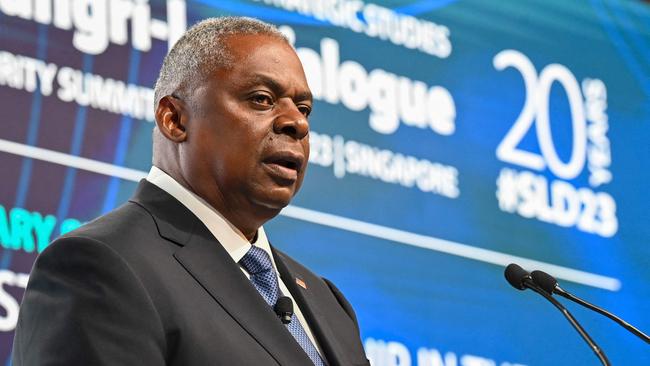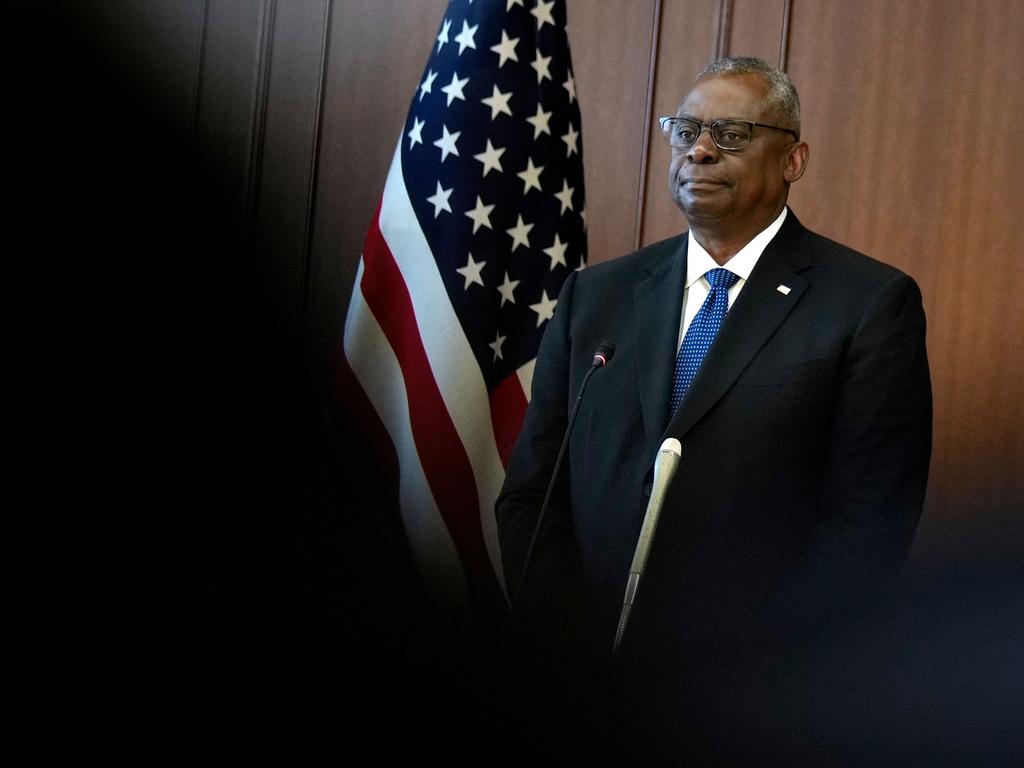US Defence Secretary Lloyd Austin backs Anthony Albanese’s call to China
US Defence Secretary Lloyd Austin has outlined Australia’s growing role in American-led efforts to deter Chinese military action in the region.

US Defence Secretary Lloyd Austin has backed Anthony Albanese’s call for Beijing to work with Washington to establish “guardrails” to avoid conflict and outlined Australia’s growing role in American-led efforts to deter Chinese military action in the region.
President Joe Biden’s top defence official — speaking the morning after Prime Minister Albanese gave the opening address at a security conference in Singapore — said his frequent visits to the region had underscored a widespread and growing desire for a “free and open and secure Indo Pacific”.
“As we all heard from Prime Minister Albanese last night, each country has a role to play. And the choices made by countries across the region reflect the deepening commitment to these shared principles,” Secretary Austin told delegates at the Shangri-La Dialogue, the region’s most important security forum, on Saturday.
In his Friday evening speech, the Australian Prime Minister urged Beijing to talk to Washington and work with the Biden administration to establish “guardrails” to maintain peace in the region.
Those remarks were made after China refused America’s request for Secretary Austin to meet with his Chinese counterpart Defence Minister Li Shangfu, who will address the dialogue on Sunday.
References to Australia were woven throughout Secretary Austin’s Saturday morning address to the summit, which is being held at a time of heightened anxiety over Xi Jinping’s intentions towards Taiwan.
America’s Defence Secretary endorsed Mr Albanese’s calls for guardrails, an idea long championed by Australia’s now Ambassador to America, Kevin Rudd.
“We‘re working to strengthen the guardrails against conflict … the United States believes that open lines of communication with the People’s Republic of China are essential, especially between our defence and military leaders,” Mr Austin said.
“For responsible defence leaders, the right time to talk is anytime … The right time to talk is now. Dialogue is not a reward — it is a necessity. A cordial handshake over dinner is no substitute for a substantive engagement.”
The American and Chinese defence chiefs briefly shook hands on Friday night, before taking their seats on the head table with Mr Albanese and Singapore’s Acting Prime Minister Lawrence Wong.
As well as the handshake, China’s Defence Minster Li Shangfu had dinner with Australian PM @AlboMP — and, on the same head table, US Defence Secretary Llyod Austin.
— Will Glasgow (@wmdglasgow) June 2, 2023
Props to the @IISS_org seating committee https://t.co/3UOTAqPQjnpic.twitter.com/KZF9ZNUmtH
Mr Albanese spoke to the Chinese defence chief through an interpreter. The Prime Minister’s office has not yet commented on any feedback Mr Li may have given on Mr Albanese’s speech.
William Choong, senior fellow at Singapore’s ISEAS-Yusof Ishak Institute, said Beijing would likely see much of the Australian prime minister’s speech as “tantamount to provocation”.
“It is highly unlikely that Mr Albanese’s comments, which are totally rational and pragmatic, will go down well with the Chinese,” he told The Straits Times.
On Saturday, the US Defence Secretary said Australia was one of America’s “staunch allies” in the region and was, along with Japan, a key site for basing American forces.
Mr Austin said “the historic AUKUS partnership”, along with work with Japan on missile defence technologies, demonstrated America’s efforts to ensure its allies and partners have the capabilities that they need to deter aggression.
“More capable allies and partners magnify all of our security.”
Mr Austin said he would meet later today with Australian Defence Minister Richard Marles and their Japanese and Philippine counterparts to discuss stronger co-operation, “especially in the maritime domain”.
He also flagged the importance of next month’s Exercise Talisman Saber, a biennial military exercise held in Australia, which will include 12 other countries.
“It will be the largest iteration ever, with more than 30,000 people participating, including a significant contingent from Japan. And it is yet another way that European countries like France and Germany and the UK are standing up for our shared values in the Indo Pacific.”
The American Defence Secretary said Washington would continue to work with allies and partners to counter China’s aggressive claims in the South China Sea, a major concern in South East Asia, particularly in Vietnam and the Philippines.
“We will continue to work to ensure that no one country can assert control over shared waterways … We won‘t be deterred by dangerous operational behaviour at sea or in international airspace.”
In his Friday evening address, Mr Albanese said Australia was working with other countries to make it “crystal clear” to that “when it comes to any unilateral attempt to change the status quo by force — be it in Taiwan, the South China Sea, the East China Sea or elsewhere — the risk of conflict will always far outweigh any potential reward.”
Mr Austin echoed that message on Saturday, focusing on the catastrophic consequences of a war in Taiwan, the linchpin of the international semiconductor industry.
“The United States remains deeply committed to preserving the status quo in the Strait consistent with our long standing ‘One China’ policy while fulfilling our well established obligations under the Taiwan Relations Act.
“You know, the whole world has a stake in maintaining peace and stability in the Taiwan Strait — the whole world. The security of commercial shipping lanes and global supply chains depend on it. And so does freedom of navigation worldwide.
“Conflict in the Taiwan Strait would be devastating. So we are determined to maintain peace and stability across the Taiwan Strait. And so are a number of countries around other countries around the world, and that number continues to grow.”







To join the conversation, please log in. Don't have an account? Register
Join the conversation, you are commenting as Logout